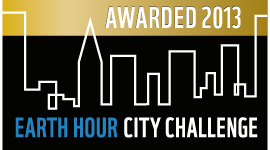Oslo EV-city
Posted on March, 01 2012
Accelerating the electric car shift
Accelerating the electric car shift
With the world's highest number of charging stations per capita, extensive support to owners of electric vehicles (EVs), and its own EV company Think, Oslo has established itself as a world-leading city for electric cars. The city even has the world’s first EV car sharing service, called Move About. Many cities around the world are now planning similar programmes, paving the way for a breakthrough for electric cars.
Keywords: electric cars, Think, car sharing, charging stations, carbon neutral transport
Globally, China has taken the lead with 90% of electric car production, subsidies for large fleets of EVs (e.g. for city authorities and taxi companies), and thousands of charging stations in bigger cities (in 2010, 6,209 charging points were built in 27 cities). Government targets are for an annual production of 500,000 EVs by 2013, and millions of charging points by the year 2020.
Zero-carbon public transport
Yet with the world's highest number of charging stations per capita, Oslo is currently the leading city for electric cars. During the first decade of the new millennium Oslo developed high environmental ambitions and in 2010-11 it was a finalist in the EU’s European Green Capital, praised for its work with green areas and biodiversity. With the objective of carbon neutrality in public transport by 2020, Oslo's transport policy includes congestion charges, revenues from which support public transport (see also London), construction of a new subway system, smart street lamps, and support for cycling via a rental programme and subsidies.
Leading for electric cars
In recent years, Oslo has invested in becoming a leading actor in the development of electric cars. The world's largest municipal charging station with 50 loading points was opened here in 2010. Oslo had over 500 charging points by 2010’s end and planned for nearly 1,000 the following year. By 2011's end there were 3,123 charging points in all of Norway. In addition to this, the municipality is sponsoring EVs in several ways. Charging is free at municipal stations. Parking for EVs is free. EVs are exempt from congestion charges and are entitled to drive in bus lanes. The city subsidizes private construction of charging stations. And the city's own procurement rules require that new cars should either be EVs or cars with very low carbon dioxide emissions.
These policies have payed off. In 2011 Norway competed with France and Germany to be the third biggest market for EVs. Measured in EVs per capita, Norway is in a league of its own. In february of 2011, an all-electric car – the Mitsubishi i-MIEV - even topped the sales list of small cars in the country.
EV pioneer Think
Oslo is also the home of the EV-pioneer Think, which was founded here in 1991. Its latest model, the Think City, was the first EV to pass the EU safety regulations. In 2011 it was one of only a few crash-tested, mass-produced and highway-certified electric cars available on the world market, along with the Tesla Roadster, the Mitsubishi i-MiEV, the Nissan Leaf, the Smart ED and the Chevrolet Volt. In 2011, production of Think City was stopped, however, and Think Global filed for bankrupcy. It was later bought by Electric Mobility Solutions AS, and production is supposed to restart in 2012.
Electric car sharing
THINK collaborated on a unique project in Oslo – Move About, the world's first EV car-sharing company (see also Paris). Move About started up in Oslo in 2008 and has since expanded to Gothenburg and Copenhagen, with plans for further projects in Germany and Austria. The aim is to expand to 50 countries. The programme in Oslo has over 1,000 members and 80 cars, 79 of which are a Think City. The car-sharing system operates via smart phone and Internet. A member who wishes to use a car logs in and reserves a car for a certain distance. The cars are parked in designated parking spaces throughout the city and can only be unlocked by the person who booked the car. In 2010 Move About expanded the service in Oslo with a more traditional rental service at four city locations.
Many other cities have started to build up an infrastructure for EVs. Among these are San Francisco, Portland, London, Berlin, Amsterdam, Copenhagen and Lisbon. In collaboration with the Clinton Climate Initiative, the C40 Climate Leadership Group has created a network of 15 big cities that have committed themselves to investing in electric cars: Bogota, Buenos Aires, Chicago, Copenhagen, Delhi, Hong Kong, Houston, London, Los Angeles, Madrid, Mexico City, Toronto, Sao Paulo, Seoul and Sydney.
References
City of Oslo, Sustainable Development, http://www.byradsavdeling-for-miljo-og-samferdsel.oslo.kommune.no/miljo_og_klima/english/
Norsk elbilförening, http://www.elbil.no/
Move About, http://www.moveabout.net/
Nobil, Open database for charging stations, http://nobil.no/
C 40 Electric Vehicle Network, http://live.c40cities.org/display/Search?moduleId=10337982&searchQuery=electric+vehicle+network
Clinton Climate Initiative, Low Carbon Transportation, http://www.clintonfoundation.org/what-we-do/clinton-climate-initiative/c40-cci-cities/low-carbon-transportation
Keith Bradsher, “In China, Power in Nascent Electric Car Industry”, New York Times, December 26 2011, http://www.nytimes.com/2011/12/27/business/global/chinas-push-for-electric-cars-flows-through-grid-operators.html?pagewanted=all
“Electric Vehicle Network”, Wikipedia, http://en.wikipedia.org/wiki/Electric_vehicle_network
"Think Global", Wikipedia, http://en.wikipedia.org/wiki/Think_Global
"Eventyrlig elbilsalg i 2011", Grønn Bil, January 9 2012, http://gronnbil.no/nyheter/eventyrlig-elbilsalg-i-2011-article218-239.html
Key data are retrieved from the UN World Urbanization Prospects: The 2011 Revision, http://esa.un.org/unup/unup/index_panel2.html
Text by: Martin Jacobson







